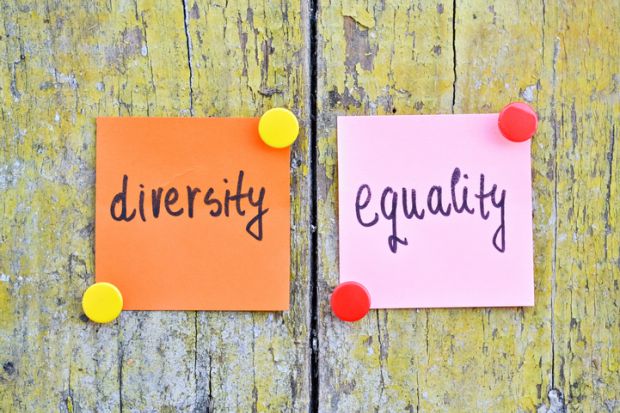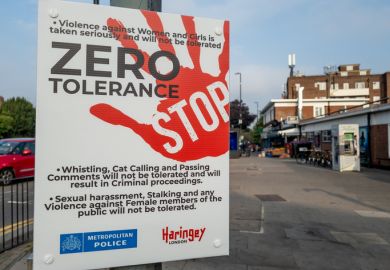A number of weeks ago, I sat with a police officer in my university office to discuss a piece of hate mail that I’d just received. We considered its threats of stabbing, death and sexual violence, and at one point the officer paused and reflected on the sender. "You know, I actually feel sorry for him," he said.
Seeing my dumbstruck face, he sputtered: “No, no – I just mean, you and I see the world as a good place, and he obviously sees it as a bad place.”
Livid, I retorted: “Well, maybe that’s easy for you, but I won’t be feeling sorry for him ever.” After he left, I puzzled over what it was that had led him to reduce a blatant injustice to a question of attitude.
After all, we have witnessed an unmistakable spike in hate crimes, seemingly wrought by a zealously anti-immigrant Brexit campaign, and in academia, we are witnessing growing reports of sexual abuse and hate crimes – and there he sat with a postcard that promised that “race traitors” like me would be killed. Yet this officer boiled things down to white supremacists’ inability to adopt a more positive take on life.
Even as it sat in his hands, he would not be moved by evidence. Why?
The truth is that this officer’s reaction didn’t feel all that different from the ways in which I’ve seen evidence of race and gender discrimination treated within academia for years. While the sector has been flooded with evidence of these inequalities – from funding councils, unions, learned societies, scholarly groups, NGOs, students, staff and others – UK higher education management has mostly shrugged its shoulders.
Since 2009, the Equality Challenge Unit has published yearly statistic reports, while the National Union of Students issued a report in 2011 and the University and College Union in 2012. Elevation Networks, the Leadership Foundation for Higher Education, the group Black British Academics, the Campaign for Science and Engineering, the Black Sister Network, the Royal Society, the Science Council, Research Councils UK and Runnymede have all also produced reports detailing inequalities in higher education.
And there’s been an avalanche of discipline-specific reports and papers, too. These relate to (to name a few): medicine, politics, chemistry, art and design, geography, literature, human geography, economic and social history, computer science, pharmacology, law, biology, molecular bioscience, music, physics, educational sociology, mathematics, economics, engineering, philosophy, astronomy and, my own discipline, history.
If you feel like you’re drowning in data, you should. These reports speak to what so many of us in academia already know from our own experiences (what is patronisingly called “anecdotal evidence”):
- That BME students see lower admission rates even when they perform as well as their white counterparts
- That white graduates have an easier time finding full-time employment
- That a race and gender pay gap persists
- That BME students see lower admission rates even when they perform as well as their white counterparts (meaning that many universities in effect practise “positive discrimination” for white students)
- That bias in hiring and promotion exacerbates this pay gap, ensuring that white men dominate senior positions
- That there are fewer than 100 black staff in full professor positions – a fraction of 1 per cent of full-time staff in UK academia.
But, despite a flowering of campaigns, benchmarks, charters and equalities schemes – which, to be sure, have produced some positive outcomes – as a sector, higher education has failed to act decisively on this mountain of evidence.
So I’m tempted to say that’s it. We know that inequalities are foundational to UK higher education, so it’s now incumbent on universities to prove the existence of equality – equality of opportunity (including the total absence of gender and race bias and sexual harassment), equality in admissions and the setting of assessments, equality in hiring and promotions, equality as a feature that can be traced through the curriculum.
The problem is one of will and not of knowledge. University managers have always known that inequalities shape every facet of university life, but they’ve never taken decisive action aimed at eradicating institutional racism and sexism. They’ve never exercised the political will to tackle these problems.
Take, for instance, one of the many facets of institutional sexism – sexual harassment. Professor Sara Ahmed made headlines last year when she resigned her post at Goldsmiths, University of London following efforts to pressure the institution into action around sexual harassment. “I have resigned in protest against the failure to address the problem of sexual harassment,” she wrote. “I have resigned because the costs of doing this work have been too high.”
Related to sexual harassment is the way in which academics – often male – abuse their positions of power in seeking relationships with junior colleagues or students. Don’t get me wrong – lecturers often enter relationships mutually, and I presume that this happens between students and lecturers as well. However, universities do little to deter abuses of power.
The case of University of Sussex lecturer Lee Salter – who was initially allowed to continue teaching after being found guilty of assaulting Allison Smith, a student he met during induction and had been dating – tells us something about how unwilling universities are to act on the knowledge they have.
Importantly, universities maintain their unwillingness despite the costs. Ahmed, for one, has quit UK higher education altogether. Not just universities and their students, but larger British society pays the price of this brain drain in the classes not taught, the prestige lost and the research income not gained.
Real will is not an emotional response alone, nor is it a statement of intentions. It is not an equal opportunities policy statement. It’s a commitment that is shown through tremendous resource provision and prioritisation. In the case of addressing race and gender inequalities, it also means taking evidence seriously – seriously enough that whole structures of admissions, staffing and curriculum development are overhauled.
We will know that UK universities are exercising the will needed to address institutional racism and sexism when positive discrimination for white students ceases and when those who are in power are ceding their power to women and faculty of colour. Because what an absence of will comes down to is a fierce protective impulse for a status quo that benefits those who are already in power – in universities or anywhere else.
Say Burgin is a lecturer in American history at the University of Leeds.
Register to continue
Why register?
- Registration is free and only takes a moment
- Once registered, you can read 3 articles a month
- Sign up for our newsletter
Subscribe
Or subscribe for unlimited access to:
- Unlimited access to news, views, insights & reviews
- Digital editions
- Digital access to THE’s university and college rankings analysis
Already registered or a current subscriber?








